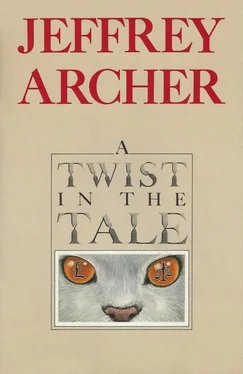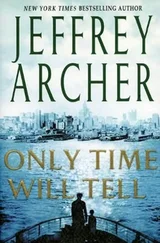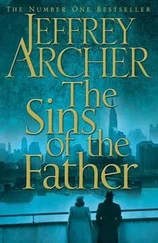Later that morning, Menzies appeared before the magistrates at the Horseferry Road court, charged with the murder of Carla Moorland. The police had been successful in opposing bail, the Standard reassured me.
It takes six months, I was to discover, for a case of this gravity to reach the Old Bailey. Paul Menzies passed those months on remand in Brixton Prison. I spent the same period fearful of every telephone call, every knock on the door, every unexpected visitor. Each one created its own nightmare. Innocent people have no idea how many such incidents occur every day. I went about my job as best I could, often wondering if Menzies knew of my relationship with Carla, if he knew my name or if he even knew of my existence.
It must have been a couple of months before the trial was due to open that the company held its annual general meeting. It had taken some considerable creative accountancy on my part to produce a set of figures that showed us managing any profit at all. We certainly didn’t pay our shareholders a dividend that year.
I came away from the meeting relieved, almost elated. Months had passed since Carla’s death and not one incident had occurred during that period to suggest that anyone suspected I had even known her, let alone been the cause of her death. I still felt guilty about Carla, even missed her, but I was now able to go for a whole day without fear entering my mind. Strangely, I felt no guilt about Menzies’ plight. After all, it was he who had become the instrument that was going to keep me from a lifetime spent in prison. So when the blow came it had double the impact.
It was on August 26 — I shall never forget it — that I received a letter which made me realize it might be necessary to follow every word of the trial. However much I tried to convince myself I should explain why I couldn’t be involved, I knew I wouldn’t be able to resist it.
That same morning, a Friday — I suppose these things always happen on a Friday — I was called in for what I assumed was to be a routine weekly meeting with the managing director, only to be informed that the company no longer required my services.
‘Frankly, in the last few months your work has gone from bad to worse,’ I was told.
I didn’t feel able to disagree with him.
‘And you have left me with no choice but to replace you.’
A polite way of saying, ‘You’re sacked.’
‘Your desk will be cleared by five this evening,’ the managing director continued, ‘when you will receive a check from the accounts department of £17,500.’
I raised an eyebrow.
‘Six months’ compensation, as stipulated in your contract when we took over the company,’ he explained.
When the managing director stretched out his hand it was not to wish me luck, but to ask for the keys of my Rover.
I remember my first thought when he had informed me of his decision: at least I will be able to attend every day of the trial without any hassle.
Elizabeth took the news of my sacking badly and only asked what plans I had for finding a new job. During the next month I pretended to look for a position in another company but realized I couldn’t hope to settle down to anything until the case was over.
On the morning of the trial all the popular papers had colorful background pieces. The Daily Express even displayed on its front page a flattering picture of Carla in a swimsuit on the beach at Marbella: I wondered how much her sister in Fulham had been paid for that particular item. Alongside her was a profile photo of Paul Menzies which made him look as if he was already a convict.
I was amongst the first to be told in which court at the Old Bailey the case of the Crown v. Menzies would be tried. A uniformed policeman gave me detailed directions and along with several others I made my way to Court No. 4.
Once I had reached the courtroom I filed in and made sure that I sat on the end of the row. I looked round thinking everyone would stare at me, but to my relief no one showed the slightest interest.
I had a good view of the defendant as he stood in the dock. Menzies was a frail man who appeared as if he had recently lost a lot of weight; fifty-one, the newspapers had said, but he looked nearer sixty. I began to wonder how much I must have aged over the past few months.
Menzies wore a smart, dark blue suit that hung loosely on him, a clean shirt and what I thought must be a regimental tie. His gray thinning hair was swept straight back; a small silver moustache gave him a military air. He certainly didn’t look like a murderer or much of a catch as a lover, but anyone glancing toward me would surely have come to the same conclusion. I searched around the sea of faces for Mrs. Menzies but no one in the court fit the newspaper description of her.
We all rose when Mr. Justice Buchanan came in. ‘The Crown v. Menzies,’ the clerk of the court read out.
The judge leaned forward, to tell Menzies that he could be seated and then turned slowly toward the jury box.
He explained that, although there had been considerable press interest in the case, their opinion was all that mattered because they alone would be asked to decide if the prisoner were guilty or not guilty of murder. He also advised the jury against reading any newspaper articles concerning the trial or listening to anyone else’s views, especially those who had not been present in court: such people, he said, were always the first to have an immutable opinion on what the verdict should be. He went on to remind the jury how important it was to concentrate on the evidence because a man’s whole life was at stake. I found myself nodding in agreement.
I glanced round the court hoping there was nobody there who would recognize me. Menzies’ eyes remained fixed firmly on the judge, who was turning back to face the prosecuting counsel.
Even as Sir Humphrey Mountcliff rose from his place on the bench I was thankful he was against Menzies and not me. A man of dominating height with a high forehead and silver gray hair, he commanded the court not only with his physical presence but with a voice that was never less than authoritative.
To a silent assembly he spent the rest of the morning setting out the case for the prosecution. His eyes rarely left the jury box except to occasionally peer down at his notes.
He reconstructed the events as he imagined they had happened that evening in April.
The opening address lasted two and a half hours, shorter than I’d expected. The judge then suggested a break for lunch and asked us all to be back in our places by ten past two.
After lunch Sir Humphrey called his first witness, Detective Inspector Simmons. I was unable to look directly at the policeman while he presented his evidence. Each reply he gave was as if he were addressing me personally. I wondered if he suspected all along that there was another man. Nevertheless Simmons gave a highly professional account of himself as he described in detail how they had found the body and later traced Menzies through two witnesses and the damning parking ticket. By the time Sir Humphrey sat down few people in that court could have felt that Simmons had arrested the wrong man.
Menzies’ defense counsel, who rose to cross-examine the Detective Inspector, could not have been in greater contrast to Sir Humphrey. Mr. Robert Scott, QC, was short and stocky, with thick bushy eyebrows. He spoke slowly and without inflection. I was happy to observe that one member of the jury was having difficulty in staying awake.
For the next twenty minutes Scott took the Detective Inspector painstakingly back over his evidence but was unable to make Simmons retract anything substantial. As the Inspector stepped out of the witness box I felt confident enough to look him straight in the eye.
Читать дальше












